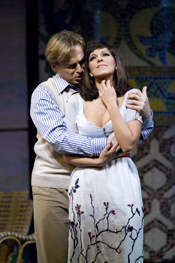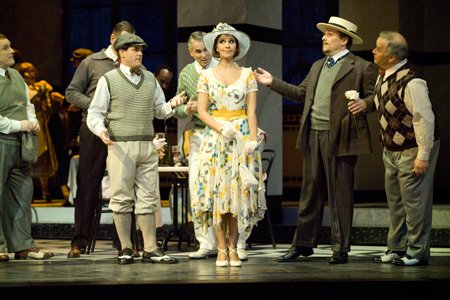
11 Nov 2007
This “Swallow” Makes November Summery
It’s somewhat of a mystery why Puccini’s 1917 “La Rondine” is such a neglected, rarely-performed opera.
English Touring Opera are delighted to announce a season of lyric monodramas to tour nationally from October to December. The season features music for solo singer and piano by Argento, Britten, Tippett and Shostakovich with a bold and inventive approach to making opera during social distancing.
This tenth of ten Live from London concerts was in fact a recorded live performance from California. It was no less enjoyable for that, and it was also uplifting to learn that this wasn’t in fact the ‘last’ LfL event that we will be able to enjoy, courtesy of VOCES8 and their fellow vocal ensembles (more below …).
Ever since Wigmore Hall announced their superb series of autumn concerts, all streamed live and available free of charge, I’d been looking forward to this song recital by Ian Bostridge and Imogen Cooper.
Although Stile Antico’s programme article for their Live from London recital introduced their selection from the many treasures of the English Renaissance in the context of the theological debates and upheavals of the Tudor and Elizabethan years, their performance was more evocative of private chamber music than of public liturgy.
Evidently, face masks don’t stifle appreciative “Bravo!”s. And, reducing audience numbers doesn’t lower the volume of such acclamations. For, the audience at Wigmore Hall gave soprano Elizabeth Llewellyn and pianist Simon Lepper a greatly deserved warm reception and hearty response following this lunchtime recital of late-Romantic song.
For this week’s Live from London vocal recital we moved from the home of VOCES8, St Anne and St Agnes in the City of London, to Kings Place, where The Sixteen - who have been associate artists at the venue for some time - presented a programme of music and words bound together by the theme of ‘reflection’.
'Such is your divine Disposation that both you excellently understand, and royally entertaine the Exercise of Musicke.’
‘And there was war in heaven: Michael and his angels fought against the dragon; and the dragon fought and his angels, And prevailed not; neither was their place found any more in heaven … that old serpent … Satan, which deceiveth the whole world: he was cast out into the earth, and his angels were cast out with him.’
There was never any doubt that the fifth of the twelve Met Stars Live in Concert broadcasts was going to be a palpably intense and vivid event, as well as a musically stunning and theatrically enervating experience.
‘Love’ was the theme for this Live from London performance by Apollo5. Given the complexity and diversity of that human emotion, and Apollo5’s reputation for versatility and diverse repertoire, ranging from Renaissance choral music to jazz, from contemporary classical works to popular song, it was no surprise that their programme spanned 500 years and several musical styles.
The Academy of St Martin in the Fields have titled their autumn series of eight concerts - which are taking place at 5pm and 7.30pm on two Saturdays each month at their home venue in Trafalgar Square, and being filmed for streaming the following Thursday - ‘re:connect’.
The London Symphony Orchestra opened their Autumn 2020 season with a homage to Oliver Knussen, who died at the age of 66 in July 2018. The programme traced a national musical lineage through the twentieth century, from Britten to Knussen, on to Mark-Anthony Turnage, and entwining the LSO and Rattle too.
With the Live from London digital vocal festival entering the second half of the series, the festival’s host, VOCES8, returned to their home at St Annes and St Agnes in the City of London to present a sequence of ‘Choral Dances’ - vocal music inspired by dance, embracing diverse genres from the Renaissance madrigal to swing jazz.
Just a few unison string wriggles from the opening of Mozart’s overture to Le nozze di Figaro are enough to make any opera-lover perch on the edge of their seat, in excited anticipation of the drama in music to come, so there could be no other curtain-raiser for this Gala Concert at the Royal Opera House, the latest instalment from ‘their House’ to ‘our houses’.
"Before the ending of the day, creator of all things, we pray that, with your accustomed mercy, you may watch over us."
The doors at The Metropolitan Opera will not open to live audiences until 2021 at the earliest, and the likelihood of normal operatic life resuming in cities around the world looks but a distant dream at present. But, while we may not be invited from our homes into the opera house for some time yet, with its free daily screenings of past productions and its pay-per-view Met Stars Live in Concert series, the Met continues to bring opera into our homes.
Music-making at this year’s Grange Festival Opera may have fallen silent in June and July, but the country house and extensive grounds of The Grange provided an ideal setting for a weekend of twelve specially conceived ‘promenade’ performances encompassing music and dance.
There’s a “slide of harmony” and “all the bones leave your body at that moment and you collapse to the floor, it’s so extraordinary.”
“Music for a while, shall all your cares beguile.”
The hum of bees rising from myriad scented blooms; gentle strains of birdsong; the cheerful chatter of picnickers beside a still lake; decorous thwacks of leather on willow; song and music floating through the warm evening air.

It’s somewhat of a mystery why Puccini’s 1917 “La Rondine” is such a neglected, rarely-performed opera.
With simple, repetitious but ravishing melodies, this updated story of “La Traviata” (good-hearted courtesan finds and loses true — if impecunious — love) is almost as rare as hen’s teeth.
In fact, the San Francisco Opera production opening tonight is only the second time it’s seen in the War Memorial. There was a single performance in 1934 (and Spring Opera Theater productions elsewhere in the city).
David Gockley took a chance on this cotton-candy Italianate Viennese-Hungarian operetta (the best Franz Lehar piece he never wrote) about love in Paris, reviving it after a hiatus of seven decades. The risk of filling the house seven times is ameliorated by engaging Angela Gheorghiu to sing the title role in her San Francisco Opera debut — and, equally important, assembling a very good cast.
Gheorghiu — a soprano of beautiful, soaring voice — sang heck out of the role, but the diva also fit into an excellent ensemble. In the role of Ruggero, the man who takes the “fallen woman” away from her comfortable den of cheerful depravity, Misha Didyk had by far his best outing in the War Memorial. He has it all: a lyrical lilt, a strongly projected voice, in a seemingly effortless performance.
Anna Christy is the lively Lisette, the maid; Gerald Powers is making his local debut as world-weary, happily exploitative poet, Prunier. Adler Fellows Rhoslyn Jones, Melody Moore, Katherine Tier, and Ji Young Yang make fine contributions in this large production. So strong is the cast that the minor role of sugar daddy Rambaldo is assigned to Philip Skinner, the mighty bass-baritone.
The Nicolas Joel production, coming from London and Toulouse, is quite beautiful, with Ezio Frigerio’s sets and Franca Squarciapino’s costumes. Stephen Barlow’s direction is misguided, however, forcing artificial, exaggerated movements on the principals, taking away whatever possible realism there is in the work. Gheorghiu and Christy especially overdid the frisky ACTING at the beginning, Gheorghiu settling down in the second act, and creating a dramatically more valid portrayal in the long duet that makes up most of the final act.
 Angela Gheorghiu (Magda de Civry) and Chorus
Angela Gheorghiu (Magda de Civry) and Chorus
Overdoing is also the hallmark of Ion Marin’s conducting, those already large, sweeping melodies made to thunder as if Walhalla went up in smoke in a misplaced Twilight of the Cafe Society. In the few passages not written fortissimo, Marin’s hard-working orchestra stepped all over the vocal lines.
And yet, the pleasantness of the score, the excellence of the principals’ performance, and the likelihood that “La Rondine” may not come around again in this century add up to an easy recommendation to attend the tale of the Swallow.
Janos Gereben
www.sfcv.org